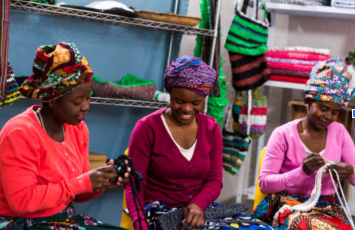
|
Getting your Trinity Audio player ready...
|
The bustling market of Idumota has a rich history of women-owned businesses. The women engaged in diverse businesses ranging from clothes to accessories to kitchen utensils. As a commercial district, Oshodi is a testimony to women’s active participation in trade, especially in small-scale businesses, and Yaba hosts a growing number of female entrepreneurs. Entrepreneurship is often celebrated as a modern phenomenon driven by innovation and ambition. Still, the truth about its pioneers and key drivers has been distorted, and this article will unveil the concerted myths.
In Nigerian society, long before the British invasion, women took the central stage in entrepreneurship. They were the forerunners who took the remains of their husbands’ farm produce to the market for sale. They played the dominant roles of textile producers, artists, traders, weavers, food processors, and market leaders. Their involvement in economic roles contributed greatly to the economy. The sub-Saharan region of Africa has the highest rate of female entrepreneurs globally, with approximately 26% of women involved in entrepreneurial activity. Mastercard Index of Women Entrepreneurs report (2021) showed Botswana led Africa and the world in the percentage of women business owners with 38.5%, followed closely by Uganda (38.4%), and Ghana (37.2%) respectively.
Dismantling myths that surround women in entrepreneurship
- Myth– Female-led businesses are less profitable
The perception that female-led businesses are less profitable is viewed from a perspective of patriarchy, control, and power. This myth ignites the belief that female-led businesses record high failure rates when the truth is that women have the potential to be more successful than men due to their proficiency in creative thinking and problem-solving skills.
Women-owned businesses also contribute 37 per cent to the nation’s GDP, highlighting women’s critical role in driving Nigeria’s economic growth. According to a NBS report, Nigerian women own 40% of Micro, Small and Medium Enterprises (MSMES) in the country, and these businesses contributed significantly to the country’s GDP.
- Women are less likely to start/own their own businesses.
Among the unique traits of a woman is the ability to multitask. This quality is evident in the surge of female entrepreneurs globally. The world is beyond male domination of entrepreneurship, and the rise of successful women in business is undeniable. A published study titled “ Empowerment for All” by Mastercard in commemoration of International Women’s Day 2025 highlighted that financial independence, personal ambition, and the ability to turn brilliant ideas into reality are the major drivers that create a sense of purpose among female entrepreneurs. Currently, Botswana, Uganda and Ghana have the most women business owners globally. This highlighted the significance of the presence of women entrepreneurs.
- Women don’t have the skills to lead a successful business
The idea that women don’t have the skills to lead a successful business stemmed from stereotypes and biases. Real-world examples and research have shown that women have unique traits such as empathy, emotional intelligence, resilience, multi-tasking, and organisation. These qualities manifest as leadership traits that enable them to lead and maintain a sustainable, business-focused, and successful business. Oprah Winfrey, Ibukun Awosika, and Sara Blakely prove that women have the skills to lead a successful business.
- Women have a low risk appetite
Women don’t have a low risk appetite; they are risk-aware. This means they are not afraid of risk, but they evaluate risks more thoroughly before acting. They approach risks with greater cautionary strategic planning. Also, the systematic bias that women received less funding makes them more calculative in their decisions, leading to perceived risk aversion.






